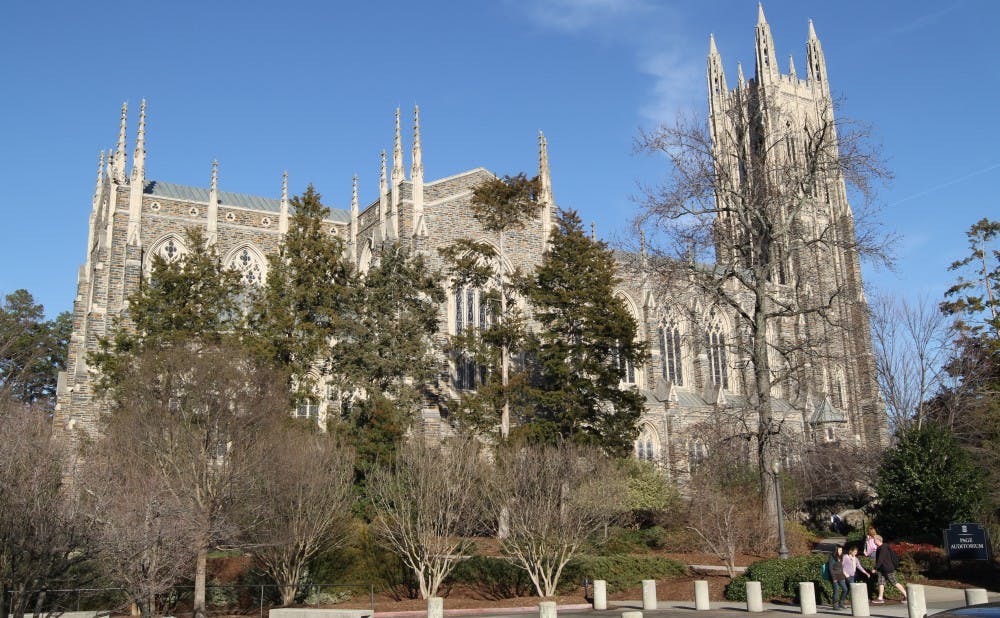Following Russia’s invasion of Ukraine, Ukrainian and Russian students spoke with The Chronicle about the reverberations of the war on their lives in Durham.
In the early morning hours of Feb. 24, local time, Russian President Vladimir Putin initiated an invasion of Ukraine with bombings in several Ukrainian cities, including the capital, Kyiv.
First-year Kseniia Kholina, an international student from Moscow, remembers it was Wednesday jazz night at the Mary Lou Williams Center for Black Culture. At 11 p.m., she left the Flowers Building and arrived at the West Campus bus stop, where she received a text from a friend.
“It’s war,” the text read.
Kholina called her family in Russia later that night. She listened to some independent Russian media and got in touch with friends at home. Everyone was in complete shock, she said. Everyone was devastated.
She described the war in Ukraine as “beyond heartbreaking.”
“A lot of people are suffering from choices they didn’t make,” she wrote.
Across campus, junior Alexa Goble was on a tenting shift in Krzyzewskiville, unaware of the invasion until she walked past some students watching CNN on a laptop. Sick to her stomach, the news did not really hit her until Thursday morning and since then, Goble described following the news as “challenging."
Goble’s mother immigrated to the United States with her parents and sister when she was seven, but all of her extended family is in Ukraine, residing in Vinnytsia and Kyiv. Since the invasion, she has served as the primary communicator between her immediate family and the rest of her relatives, communicating through Facebook Messenger, WhatsApp and Instagram direct messages.
For first-year Polyna Uzun, the early hours of Russia’s attack were a blur. What she remembers, though, is the fear that came with the flurry of texts from her relatives in Ukraine.
Her grandmother’s rapid texts described a plane flying by, and then a “boom” sound. Another plane flew by, another explosion.
“The sequence of events, that was so unemotional in a way, but it was just exactly what was happening,” Uzun said.
Uzun’s extended family in Ukraine has not been able to stay together during the war. Some of her family evacuated to another city within Ukraine, some stayed in their homes and several family members spent a few days hiding in the basement.
A few days after the initial attacks, Uzun received a video from her family walking around Mykolaiv. In it, she saw “debris everywhere, destruction.” A tank was flipped upside down and completely charred.
“Ukraine is not the same as before,” Goble said. “And I don’t think it will ever be the same anymore.”
Differing realities
Students described struggling with the dissonance between the realities in Ukraine and Russia that their families were experiencing and their current lives at Duke.
“It feels [like people are] so unaffected here. The worst thing that’s going to happen is some oil prices are going to rise,” Goble said.
She noted the response from her peers, who she said joked about the war on social media platforms like YikYak and TikTok. People have been posting “thirst traps for Zelensky,” she said, while ignoring the real consequences Ukrainian people are facing.
“My family is in literal war,” she said.
Her cousin, David, is the same age as her and studies economics in Kyiv. Goble studies financial engineering. She described their lives as always having “been so mirrored, up to this point.” But when the war began, missile attacks fell on Kyiv and David evacuated to his mother’s apartment in Vinnytsia. In Durham, Goble was tenting for a basketball game.
Uzun has struggled to convey her fears to her peers. “No one really teaches you how to respond to war,” she said.
But students also shared that people within the Duke community have reached out and offered support — professors, friends, friends’ families. Uzun, who works in Perkins Library, noted that, in a “surprising” but “incredible kind” gesture, her co-workers emailed her, asking if she was doing okay and if there was anything she needed.
Kholina, an international student from Moscow, received a personal email from Shruti Desai, associate vice president of student affairs for campus life, on Feb. 24. Desai said that administrators were “keeping an eye on the current situation” and urged her to reach out “should anything come up.” In the email, Desai noted that she was “checking in with students who have a Russian or Ukrainian connection.”
But Uzun, who was born to a Russian mother and Ukrainian father in the U.S. and holds both Russian and Ukrainian citizenship, did not receive an email from Desai or Duke administrators with any support or resources.
Uzun said the war has presented a challenge for her “because on one side, there's this inflow of support for Ukrainians but on the other hand, there's condemnation for Russians.”
“I really want people here to understand that Putin does not represent Russians at all. And most of them condemn him,” Uzun said.
She hoped that members of the Duke community could criticize Putin and the Russian government while understanding that the people of Russia are not to blame.
“No one wants this war," she said. “No Russian wants this war.”
Response from Duke
As of March 4, the Ukrainian State Emergency Service reported that over 2,000 civilians have been killed since the invasion began, but the Washington Post notes that this statistic has not been verified.
United States President Joe Biden condemned Putin’s invasion of Russia in televised remarks from the White House on Feb. 24. Biden has since announced personal sanctions against Putin and Foreign Minister Sergey Lavrov, an import ban of Russian oil and economic sanctions that target Moscow's banking, technology and aerospace sector.
Duke, however, did not send communications to the student body condemning Russia’s invasion, which resulted in mixed reactions among students with family ties to the conflict.
Goble expressed frustration that Duke administration did not send an email addressing the attacks on Ukraine, given that “there are a lot of people with Ukrainian ties.”
She noted that since the United Nations General Assembly voted by a “landslide to condemn Putin, Duke University can condemn Putin and condemn these actions with their Ukrainian students and even the Russian students.”
“Duke University needs to do something, like even one of their thoughts and prayers type of emails, just for us to feel seen and supported because this is an extreme world event,” Goble said.
But Uzun said she does not consider the lack of a statement from the University to be a concern.
“We’re a college and this is a global issue,” she said. “I don't think there's much Duke can do for it really, apart from like, getting information out there.”
Price gave his first public remarks about the conflict in Ukraine on March 1 during an American Grand Strategy lecture keynoted by Michael McFaul, the former U.S. Ambassador to Russia.
“We condemn this senseless invasion and stand with the Ukrainian people,” Price said, according to a release. He also noted actions the University is taking, including “providing outreach and care to Duke students, faculty and staff who are members of the Ukrainian community” and offering solidarity and support to “students and scholars in Ukraine.”
“We are committed as an academic institution to better understand the conflict and provide what support we can for a peaceful solution that restores and respects Ukraine’s right to self-governance,” Price added.
As of March 15, Duke administration has not sent an email to students condemning the invasion.
Get The Chronicle straight to your inbox
Signup for our weekly newsletter. Cancel at any time.

Kathryn Thomas is a Trinity junior and news editor of The Chronicle's 118th volume.

